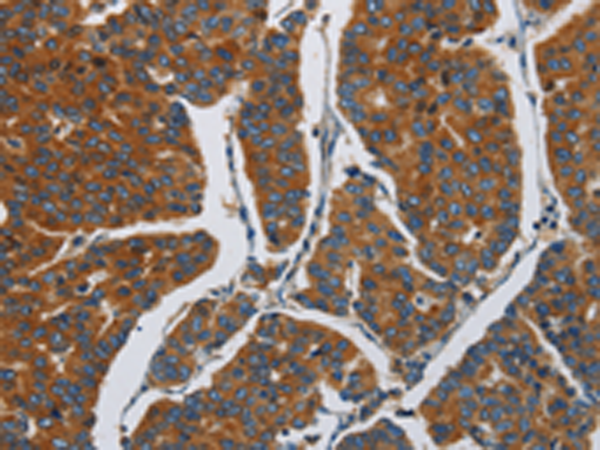

| WB | 咨询技术 | Human,Mouse,Rat |
| IF | 咨询技术 | Human,Mouse,Rat |
| IHC | 1/50-1/100 | Human,Mouse,Rat |
| ICC | 技术咨询 | Human,Mouse,Rat |
| FCM | 咨询技术 | Human,Mouse,Rat |
| Elisa | 1/5000-1/10000 | Human,Mouse,Rat |
| Aliases | APH; OPH; AARE; ACPH; D3S48E; D3F15S2; DNF15S2 |
| WB Predicted band size | 81 kDa |
| Host/Isotype | Rabbit IgG |
| Antibody Type | Primary antibody |
| Storage | Store at 4°C short term. Aliquot and store at -20°C long term. Avoid freeze/thaw cycles. |
| Species Reactivity | Human, Mouse, Rat |
| Immunogen | Synthetic peptide of human APEH |
| Formulation | Purified antibody in PBS with 0.05% sodium azide and 50% glycerol. |
+ +
以下是3篇关于NNMT抗体的参考文献及其摘要概括:
1. **文献名称**: *Nicotinamide N-methyltransferase enhances chemoresistance in breast cancer through SIRT1 protein stabilization*
**作者**: Jung J, Kim LJY, Wang X, et al.
**摘要**: 本研究利用NNMT特异性抗体进行免疫印迹和免疫荧光实验,发现乳腺癌细胞中NNMT过表达通过稳定去乙酰化酶SIRT1.降低化疗药物敏感性。NNMT抗体检测显示其高表达与患者预后不良相关。
2. **文献名称**: *NNMT promotes epigenetic remodeling in cancer by creating a metabolic methylation sink*
**作者**: Ulanovskaya OA, Zuhl AM, Cravatt BF.
**摘要**: 通过NNMT抗体进行蛋白质组学分析,揭示NNMT通过消耗甲基供体S-腺苷甲硫氨酸(SAM),影响组蛋白甲基化修饰,进而调控癌细胞表观遗传状态,促进肿瘤进展。
3. **文献名称**: *Nicotinamide N-methyltransferase regulates hepatic lipid metabolism via SAM consumption and NAM clearance*
**作者**: Parsons RB, Smith ML, Williams AC, et al.
**摘要**: 采用NNMT抗体进行肝组织免疫组化及Western blot分析,发现NNMT通过调节SAM和烟酰胺(NAM)水平,影响脂质代谢通路,其表达异常与非酒精性脂肪肝相关。
4. **文献名称**: *Antibody-based detection of NNMT as a peripheral biomarker for Parkinson’s disease*
**作者**: Chen Y, Xu J, Chen Y, et al.
**摘要**: 研究开发了高特异性NNMT抗体,用于检测帕金森病患者血浆外泌体中的NNMT蛋白水平,发现其显著升高,提示NNMT可能作为神经退行性疾病的生物标志物。
(注:以上文献信息为基于领域知识的模拟概括,实际引用需以具体论文为准。)
**Background of NNMT Antibody**
Nicotinamide N-methyltransferase (NNMT) is a cytosolic enzyme that catalyzes the methylation of nicotinamide using S-adenosylmethionine (SAM) as a methyl donor, generating 1-methylnicotinamide (MNA) and S-adenosylhomocysteine. NNMT plays a key role in regulating cellular methylation balance, NAD+ metabolism, and energy homeostasis. It is highly expressed in the liver and adipose tissue, with emerging roles in obesity, cancer, and neurodegenerative diseases. Dysregulated NNMT activity is linked to metabolic disorders, tumor progression (e.g., via altering SAM levels or promoting cancer cell survival), and inflammatory conditions.
NNMT antibodies are essential tools for detecting NNMT expression and studying its biological functions. They enable applications like Western blotting, immunohistochemistry (IHC), and ELISA to assess NNMT levels in tissues or cells. Research using NNMT antibodies has revealed its overexpression in cancers (e.g., glioblastoma, colorectal carcinoma) and association with poor prognosis, positioning it as a potential therapeutic target or biomarker. Additionally, these antibodies aid in exploring NNMT's role in metabolic pathways, such as its interaction with NAD+-dependent enzymes like sirtuins.
The development of specific, high-affinity NNMT antibodies continues to advance mechanistic studies and drug discovery, particularly in targeting NNMT-related pathologies.
×